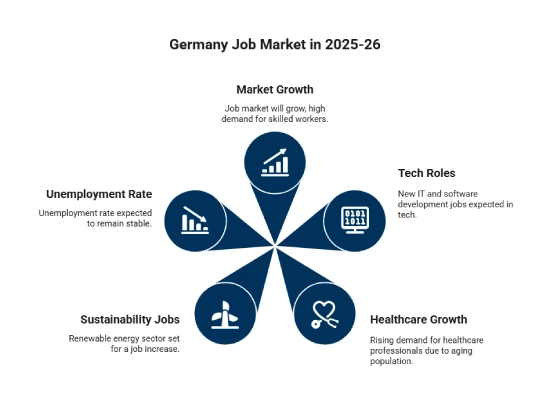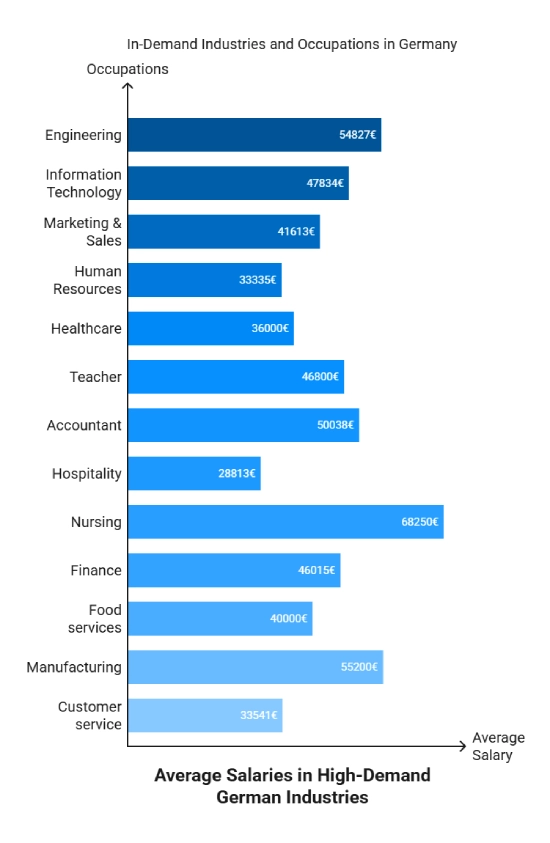Germany Job Market and Opportunities
In 2025-26, Germany's job market looks good, mainly in tech, healthcare, and engineering. Germany has a solid industrial base and is all about new ideas and protecting the environment. As the nation changes with the economy, those looking for work will find different chances, the competition is still strong. The fields that fit with Germany's tech improvements, older population, and green plans will likely need the most workers.1.5% Employment Growth:
- Germany's job market will grow by 1.5% in 2025, with high demand for skilled workers.
- 15,000+ Tech Roles: Over 15,000 new IT and software development jobs expected, especially in tech sectors.
- 10% Growth in Healthcare: Rising demand for healthcare professionals, including nurses and physicians, due to an aging population.
- 12% Rise in Sustainability Jobs: Renewable energy sector set for a 12% job increase by 2025-26.
- 5% Unemployment Rate: Unemployment rate expected to remain stable at 4.5%, ensuring a steady labor market.

*Check your eligibility to Germany through Y-Axis Germany immigration points calculator for free!
Job Outlook in Germany 2025-26
The job market in Germany is expected to do well in 2025-26 because of the country's needs and what's happening in the world economy. Germany's economy should keep expanding, leading to more jobs in tech, healthcare, and eco-friendly industries. Also, there should be a rise in the need for skilled workers in factories, engineering, and research.
General Employment Trends for the Year
- The job market should expand by about 1.5% each year, with good chances in tech, healthcare, and renewable energy.
- Remote work keeps getting more common, and there are now more flexible work options, mostly in tech and service jobs.
Factors Influencing Job Creation or Reduction
- Tech and digital changes will push job growth, mostly in AI, software, and cybersecurity.
- As the population ages and health needs increase, more medical staff will be needed.
- Economic shifts, like moving to a green economy, will create chances in renewable energy.
*Planning for Germany Immigration? Y-Axis is here to help you.
In-Demand Industries and Occupations in Germany
Germany is still a world leader in areas like cars, engineering, healthcare, and IT. The nation's focus on fixing its economy and on improvements means certain industries should keep expanding.
|
Occupations |
Salary |
|
Engineering |
€ 54,827 |
|
Information Technology |
€ 47,834 |
|
Marketing & Sales |
€ 41,613 |
|
Human Resources |
€ 33,335 |
|
Healthcare |
€ 36,000 |
|
Teacher |
€ 46,800 |
|
Accountant |
€ 50,038 |
|
Hospitality |
€ 28,813 |
|
Nursing |
€ 68,250 |
|
Finance |
€ 46,015 |
|
Food services |
€ 40,000 |
|
Manufacturing |
€ 55,200 |
|
Customer service |
€ 33,541 |

Workforce Demands in Germany
- Germany needs more skilled people to work in IT, healthcare, engineering, and research.
- The car business still needs engineers to switch to electric cars. Also, because people are getting older, healthcare, mainly for old people, needs more workers.
- Because things are becoming more digital, there is a greater need for jobs like software engineers, data analysts, and cybersecurity experts.
Examination of the Job Market in Germany
- Berlin, Munich, and Hamburg will keep having many openings in tech, digital marketing, and software jobs.
- Stuttgart and Frankfurt's manufacturing and car industries should stay strong, so they will still need engineers and technicians.
Highlighting Areas with Notable Job Opportunities
- Tech sector growth in Berlin with over 5,000 job openings in IT and software development.
- Health-related jobs in Hamburg and Munich are growing, with a projected 7% rise in healthcare vacancies by 2025.
- Sustainability jobs in renewable energy and environmental services are increasing in cities like Cologne and Leipzig.
*Willing to Work in Germany? Y-Axis will guide you in all the steps.
Impact of Technology and Automation in Germany
Technological Advancements and Automation Shaping the Job Market
- Automation should boost efficiency, mainly in manufacturing and logistics. It will also open up new jobs in AI, machine learning, and robotics.
- As Industry 4.0 grows, there will be a continued demand for skilled workers in automation and digital systems.
Potential Opportunities and Challenges for Workers in the Evolving Landscape
- Automation may make some repetitive jobs go away, but it will also open up jobs in IT and data analysis.
- To remain competitive, workers must learn to use new tech.
Skills in Demand in Germany
Key Skills Sought by Employers in Germany
- Digital Literacy
- Programming and IT Skills
- Critical Thinking
- Problem-Solving
- Flexibility
- Teamwork
- Time Management
- Creativity
- Adaptability
- Communication Skills
- Problem-Solving Abilities
- Project Management
- Language Proficiency (especially German)
- Team Collaboration
- Leadership Skills
- Cross-Cultural Competence
- Sales and Marketing Skills
- Customer Service Skills
Importance of Upskilling or Reskilling for Job Seekers
To stay competitive, job seekers need to keep learning. Getting new skills in fields like AI or renewable energy can make your job more secure and help you get ahead.
In Germany, the most in-demand skills in 2025 and 2026 will be in tech, healthcare, and sustainability. IT people, healthcare workers, and engineers will be the most wanted.
Remote Work and Flexible Arrangements in Germany
Exploration of the Continuing Trend of Remote Work
Remote work is getting more common in Germany, especially after COVID-19. A lot of companies now have hybrid or fully remote options, mostly in areas like IT, finance, and customer service. By 2025, about 30% of all jobs in Germany might be remote. This is really happening in big cities like Berlin, Munich, and Hamburg, where tech and service companies are liking how flexible remote work can be.
Implications for Both Employers and Employees
Remote work gives employers access to talent all over the world, so they can hire skilled people even if they don't live nearby. Workers get a better work-life balance, save time on commuting, and can work from anywhere. Because of this, more workers want remote jobs. Since remote work is becoming more common, more businesses are putting money into the tech and systems needed for flexible work setups.
Government Policies and Initiatives
Overview of Government Programs or Policies Influencing Employment
The German government is putting policies in place to create jobs and grow the economy. They're still focused on tech. There are programs to support businesses that hire skilled tech and digital workers. Also, the government is supporting green projects like renewable energy by giving funds to firms in areas like solar, wind, and electric cars. This is good for experts in sustainability and tech as the government works to boost new ideas and make the economy greener and more digital.
Analysis of How Policy Changes May Impact the Job Market
Germany’s environmental policies, especially those targeting climate changes, will lead to the creation of thousands of jobs in the renewable energy sector, contributing to an expected 12% job growth by 2025 in green technologies. Meanwhile, the digitization of industries is accelerating, creating a high demand for skilled IT workers, particularly in cybersecurity, software development, and data analytics. As businesses adapt to digital transformation, these policy changes will not only foster new jobs but also shape the evolution of the labor market, pushing for a tech-savvy workforce. Moreover, automation and artificial intelligence will continue to grow, making specialized tech skills crucial for career advancement in the coming years.
Challenges and Opportunities for Job Seekers in Germany
- Competition is fierce for tech, healthcare, and engineering jobs, the fields with the most growth expected in 2025-26. The demand for skilled workers is high, but there aren't many openings, so it's a tight race.
- Many people looking for jobs might have problems because they lack the skills that the tech and healthcare fields need. It's important to learn new skills or improve existing ones, since tech is changing fast and industries have different requirements.
- Industries are changing as new tech comes out, so people searching for jobs need to stay current with the needed job skills. Knowing about computers and new tech like AI, cloud computing, and cybersecurity is getting more important.
Tips and Strategies for Navigating the Job Market Successfully
- Improve Your Skills: It's a good idea for those seeking jobs to take courses and get certificates to keep their skills up to date, mainly in tech, AI, and green energy. This training can help people get noticed in crowded job areas.
- Use Your Contacts: Making connections is key in Germany's job world. Go to industry gatherings, link up with experts on sites like LinkedIn, and join job fairs to be seen and get more chances at jobs.
- Know the Industry News: Keep an eye on the latest news and new ideas in fields like tech, health, and green energy. This way, you can guess what the job market will require and change your skills to match. Knowing about government rules and plans can also help you understand how the job scene is changing.
- Think About Moving: Be willing to look at job chances in different German cities or areas where certain jobs are wanted more. Big cities like Berlin, Munich, and Hamburg usually have more job openings, especially in tech and health.
.webp)
Summary of Germany Job Outlook
In summary, the German job market is expected to grow in the tech, healthcare, and engineering fields between 2025 and 2026. Specialized skills will be highly sought after. To stay competitive, job seekers should keep up with tech changes and improve their skills. Thanks to government support and a growing digital economy, jobs should increase in several fields.
Looking for Inspiration
Explore what Global Citizens have to say about Y-Axis in shaping their future
Frequently Asked Questions
